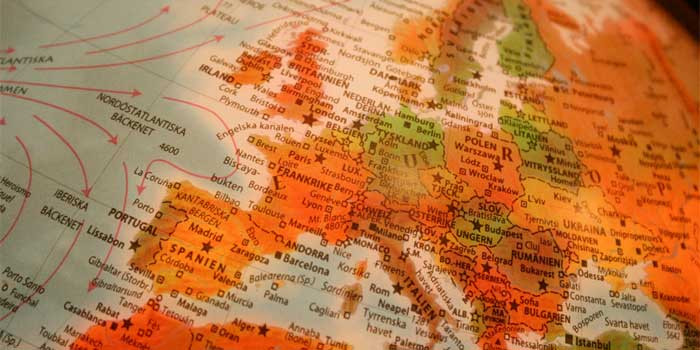Europese talen overzicht officiële taal in Europa. Welke talen worden er gesproken in Europa? Hoeveel officiële talen zijn er en in welke Europese landen worden de talen gesproken? Hoeveel sprekers zijn er van de verschillende Europese talen?
Europese talen overzicht officiële taal in Europa
In totaal worden er op dit moment nog zo’n 150 verschillende officiële talen gesproken en geschreven. Bovendien zijn er daarnaast nog vele talen en dialecten die geen officiële status hebben. Het aantal hiervan zal in de vele honderden, misschien wel duizenden lopen. Op deze pagina is een overzicht te vinden van de officiële Europese talen.
Online Nederlands leren
Je kunt heel goed online Nederlands leren via Skype, Google Hangouts of Zoom. Geschikt voor zowel mensen die hun moedertaal beter willen leren spreken en schrijver als voor mensen die een andere taal als moedertaal hebben.
Overzicht officiële taal in Europa
Hieronder kun je het alfabetisch overzicht van Europese talen vinden. Er is informatie opgenomen over de taalfamilie waartoe de taal behoort. Daarnaast is aangegeven in welk land of in welke landen de taal als officieel is erkend.
- Albanees
Albanië, Kosovo, Noord-Macedonië - Armeens
Armenië, Nagorno-Karabach - Baskisch
Spanje (Baskenland, Navarra) - Bosnisch
Bosnië en Herzegovina - Bulgaars
Bulgarije, Europese Unie - Catalaans
Spanje (Catalonië, Valencia, Balearen), Andorra - Deens
Denemarken, Faeröer, Groenland, Europese Unie - Duits
Duitsland, België, Denemarken (Zuid-Jutland), Italië (Zuid-Tirol), Liechtenstein, Luxemburg, Namibië (nationale taal), Oostenrijk, Zwitserland, Europese Unie - Engels
Verenigd Koninkrijk, Ierland, Malta, Europese Unie, Verenigde Naties - Estisch
Estland, Europese Unie - Fins
Finland, Europese Unie - Frans
Frankrijk, België, Luxemburg, Monaco, Zwitserland, Europese Unie, Verenigde Naties - Fries
Nederland (Friesland), Duitsland (Sleeswijk-Holstein) - Galicisch
Spanje (Galicië) - Georgisch
Georgië - Hongaars
Hongarije - Iers
Ierland - Italiaans
Italië, San Marino, Vaticaanstad, Zwitserland, Europese Unie - Jiddisch
rusland (Joodse Autonome Oblast), Moldavië, Zweden (erkende minderheidstaal) - Kroatisch
Kroatië, Bosnië en Herzegovina, Burgenland (Oostenrijk), Molise (Italië), Vojvodina (Servië) - Latijn
Vaticaanstad - Lets
Letland - Litouws
Litouwen, Europese Unie - Macedonisch
Noord-Macedonië - Maltees
Malta - Montenegrijns
Montenegro - Nederlands
Nederland, België, Aruba, Curaçao, Sint Maarten, Suriname, Europese Unie - Nieuwgrieks
Griekenland, Cyprus - Noors
Noors (Bokmål, Nynorsk) - Oekraïens
Oekraïne, Transnistrië - Pools
Polen, Europese Unie - Portugees
Portugal, Europese Unie - Reto-Romaans
Zwitserland - Roemeens
Roemenië, Moldavië, Servië (Vojvodina), Transnistrië, Europese Unie - Roetheens
Vojvodina, Slowakije (minderheidstaal) - Russisch
Rusland, Wit-Rusland, Kazachstan, Kirgizië, Transnistrië, Verenigde Naties - Samisch
Finland, Noorwegen, Zweden - Schots
Schotland, Noord-Ierland - Servisch
Servië, Montenegro, Kosovo, Bosnië en Herzegovina - Sloveens
Slovenië, Karinthië (Oostenrijk), Gorizia (Italië), Europese Unie - Slowaaks
Slowakije, Vojvodina (Servië), Europese Unie - Spaans
Spanje, Europese Unie, Verenigde Naties - Tsjechisch
Tsjechië, Europese Unie - Turks
Turkije - Wit-Russisch / Belarussisch
Wit-Rusland, Polen (Podlachië) - Zweeds
Zweden, Finland, Europese Unie
Uitgebreide informatie over officiële Europese talen
Bosnisch
- Indo Europese taal
- Slavische taal
- Zuid-Slavische taal
- Slavische taal
- Officiële taal: Bosnië en Herzegovina
- Sprekers: 3,5 miljoen
- Alfabet: Latijns
Bulgaars
- Indo Europese taal
- Slavische taal
- Zuid-Slavische taal
- Slavische taal
- Officiële taal: Bulgarije, Europese Unie
- Sprekers: 9 miljoen
- Alfabet: cyrillisch
Duits
- Indo Europese taal
- Germaanse taal
- West-Germaanse taal
- Germaanse taal
- Officiële taal: Duitsland, België, Denemarken (Zuid-Jutland), Italië (Zuid-Tirol), Liechtenstein, Luxemburg, Namibië (nationale taal), Oostenrijk, Zwitserland, Europese Unie
- Sprekers: 101 miljoen
- Alfabet: Latijns
Kroatisch
- Indo Europese taal
- Slavische taal
- Zuid-Slavische taal
- Slavische taal
- Officiële taal: Kroatië, Bosnië en Herzegovina, Burgenland (Oostenrijk), Molise (Italië), Vojvodina (Servië)
- Sprekers: 5,5, miljoen
- Alfabet: Latijns
Macedonisch
- Indo Europese taal
- Slavische taal
- Zuid-Slavische taal
- Slavische taal
- Officiële taal: Noord-Macedonië
- Sprekers: 2 miljoen
- Alfabet: cyrillisch
Montenegrijns
- Indo Europese taal
- Slavische taal
- Zuid-Slavische taal
- Slavische taal
- Officiële taal: Montenegro
- Sprekers: 150.000
- Alfabet: Latijns en cyrillisch
Oekraïens
- Indo Europese taal
- Slavische taal
- Oost-Slavische taal
- Slavische taal
- Officiële taal: Oekraïne, Transnistrië
- Sprekers: 39 miljoen
- Alfabet: cyrillisch
Pools
- Indo Europese taal
- Slavische taal
- West-Slavische taal
- Slavische taal
- Officiële taal: Polen, Europese Unie
- Sprekers: 40 miljoen
- Alfabet: Latijns (Poolse variant)
Roetheens
- Indo Europese taal
- Slavische taal
- Oost-Slavische taal
- Slavische taal
- Officiële taal: Vojvodina, Slowakije (minderheidstaal)
- Sprekers: 60.000
- Alfabet: cyrillisch
Russisch
- Indo Europese taal
- Slavische taal
- Oost-Slavische taal
- Slavische taal
- Officiële taal: Rusland, Wit-Rusland, Kazachstan, Kirgizië, Transnistrië, Verenigde Naties
- Sprekers: 150 miljoen, 110 miljoen als tweede taal
- Alfabet: cyrillisch
Servisch
- Indo Europese taal
- Slavische taal
- Zuid-Slavische taal
- Slavische taal
- Officiële taal: Servië, Montenegro, Kosovo, Bosnië en Herzegovina
- Sprekers: 12 miljoen
- Alfabet: Latijns
Sloveens
- Indo Europese taal
- Slavische taal
- Zuid-Slavische taal
- Slavische taal
- Officiële taal: Slovenië, Karinthië (Oostenrijk), Gorizia (Italië), Europese Unie
- Sprekers: 2,2 miljoen
- Alfabet: Latijns
Slowaaks
- Indo Europese taal
- Slavische taal
- West-Slavische taal
- Slavische taal
- Officiële taal: Slowakije, Vojvodina (Servië), Europese Unie
- Sprekers: 6 miljoen
- Alfabet: Latijns
Tsjechisch
- Indo Europese taal
- Slavische taal
- West-Slavische taal
- Slavische taal
- Officiële taal: Tsjechië, Europese Unie
- Sprekers: 12 miljoen
- Alfabet: Latijns
Wit-Russisch / Belarussisch
- Indo Europese taal
- Slavische taal
- Oost-Slavische taal
- Slavische taal
- Officiële taal: Wit-Rusland, Polen (Podlachië)
- Sprekers: 4,7 miljoen
- Alfabet: cyrillisch

